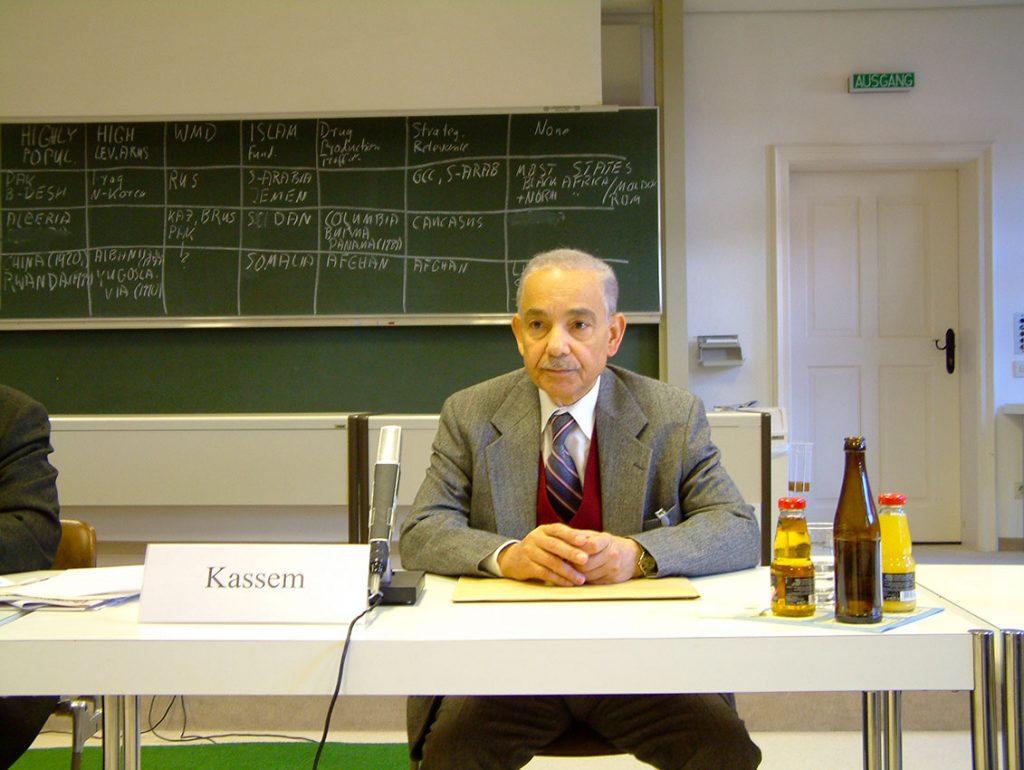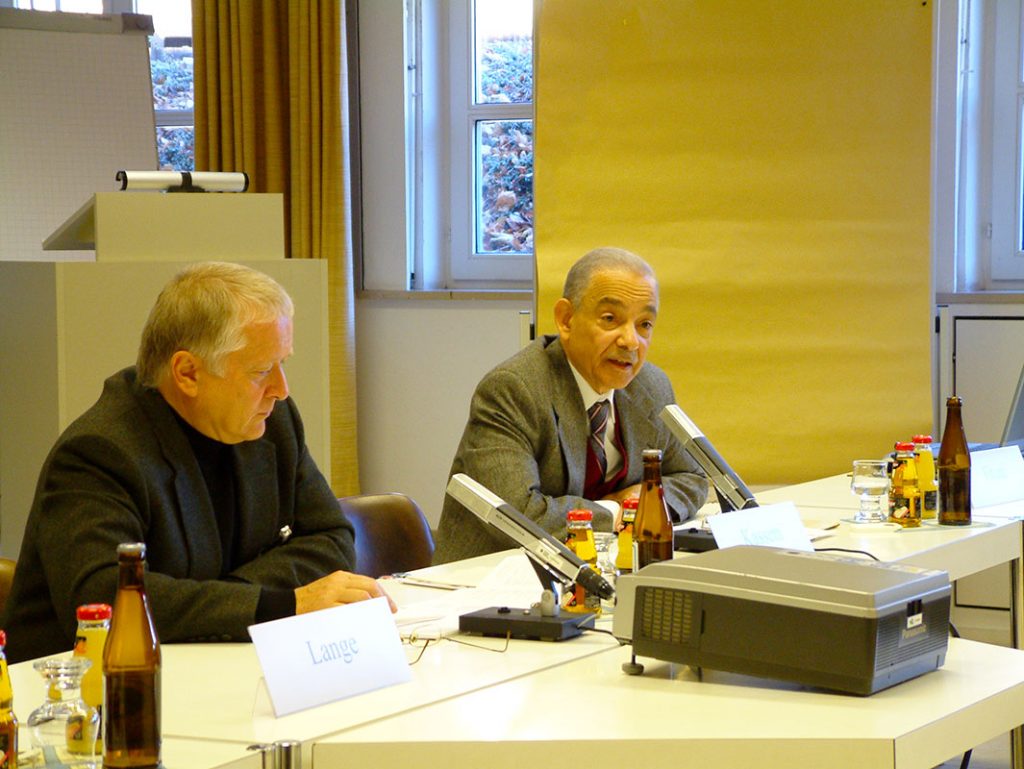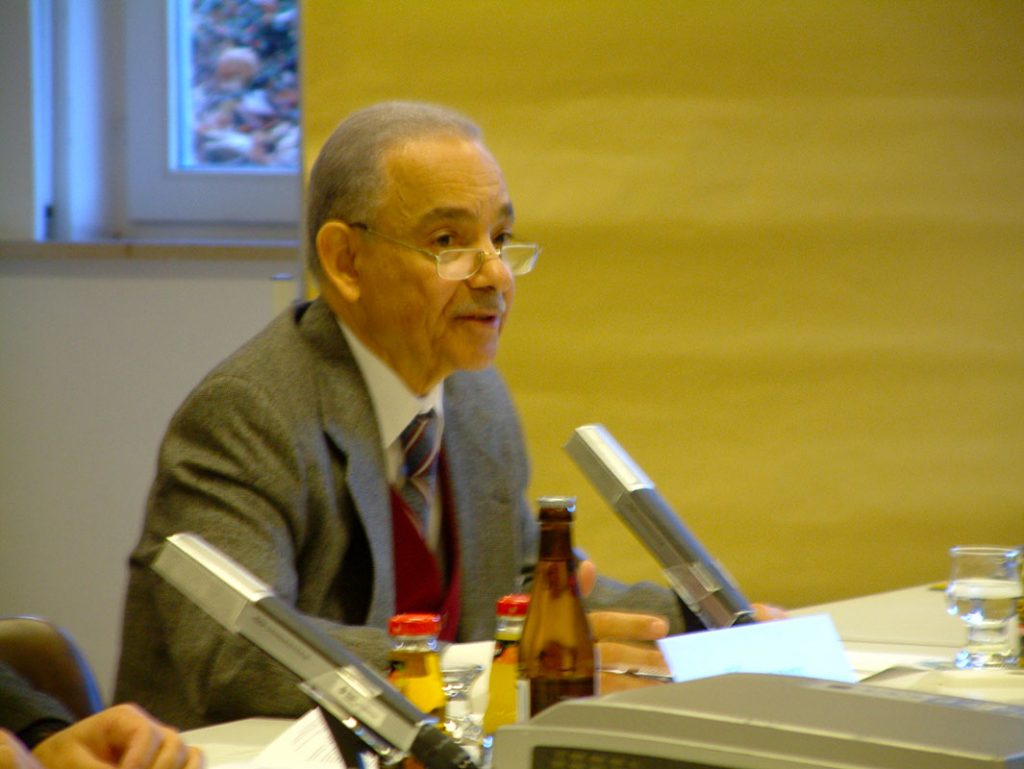Presentation delivered in Wildbad Kreuth, Bavaria, by Ambassador Mahmoud Kassem at the International Expert Conference organized by the Akademie für Politik und Zeitgeschehen of the Hanns-Seidel Foundation. Ambassador Kassem is UN Assistant-Secretary-General and Chairman of UN Expert Panel on the Exploitation of National Resources of the DR of the Congo. Wildbad Kreuth, November 10-11, 2003.

I) The State’s Role: Criteria for Failed or Strong States
- Provision of Political Needs
Nation states exist to deliver political needs and services to persons living within their territory. It is according to their performances – the levels of their effective delivery of the most crucial political requirement – that strong states may be distinguished from weak states, and weak states from failed or collapsed states.
There is a hierarchy of political needs. None is as critical as the supply of security, especially human security. This includes preventing cross-border invasions and infiltrations, elimination of domestic threats upon the national order or social structure, prevention of crime and any related dangers to domestic human security and enabling citizens to resolve their differences with the state and their fellow inhabitants without recourse to physical coercion, through enforceable body of laws and an effective judicial system.
Other political needs are services which include health care, educational instruction and the arteries of commerce such as communication networks, national currency and banking system.
- The States Legitimacy
A nation state also fails when it loses legitimacy. One criteria is when its nominal borders become irrelevant with groups seeking autonomous control within one or more parts of the national territory.
A further view is when rulers are perceived to be working for themselves, citizens transfer their allegiances to clan and group leaders, some whom become warlords.

II) Failed and Collapsed States
There does not seem to be a universally accepted definition of a failed state. The most general one describes that » the basic functions of the state are no longer performed ».
The Failed States project at Purdue University defined failed states » by the patters of govemmental collapse within a nation which often brings demands ( because of the refugees they foster, the human rights they abridge etc) which threaten the security of their surrounding states and region. »
Generally it can be said that failed states are tense, deeply conflicted, dangerous, and contested bitterly by warring factions. The intensity as well as the consuming quality of that violence, engulfing great swath of states such as the Democratic Republic of the Congo conflict, identifies a failed state.
History reveals a number of common indicators of failed states :
• Disharmony between communities.
• The regime preys on their own constituents (as Mobutu’s reign in Zaire or the Taliban’s Afghanistan)
• Most failed states cannot control its peripheral regions. The extent of a state’s failure can be measured by the extent of its geographical expanse genuinely controlled by the official government. Consider Kinshasa and its control over its eastern territory.
• The state cannot control criminal violence, as a result citizens turn to alternatives such as warlords or tribal institutions for protection.
• Failed states exhibit flawed institutions. Only the executive fonctions. Democratic debate is noticeably absent, the judiciary is derivative of the executive rather than being independent and the bureaucracy exists solely to carry out the orders of the executive.
• Effective educational and medical systems are privatised informally.
• Corruption flourishes.
• Per capita levels of annual gross domestic product decline.
• The states inhabitants are more likely to fall victims to food shortages and Wide spread hunger.
The experience of the UN Expert Panel on the DRC that I chair shows that failed states offer unparalleled economic opportunity – but only for a privileged few. Immense profits are available from the discretionary application of regulatory advantages, access to natural resources and currency speculation.
A collapsed State is a rare and extreme version of a failed state. Political needs and services are obtained through private or ad hoc means. Security is equated with the mule of the strong. A collapsed state exhibits a vacuum of authority. (Somalia, Afghanistan, Iraq and Liberia).
III) Historical Background
The Failed States existing at present are essentially Third World States which have been exposed and affected or influenced by these major geopolitical factors:
• The heritage of colonial era which had lasted long enough to destroy traditional social structures, but not long enough to replace them with Western constitutional structures. The colonial regimes did not care . ~ . to provide them with an effective identity as a new state geared toward a modem nationbuilding process. As a result, the Industrial Revolution was totally missed by these Third World States. Their status as European colonies continued till only alter World War II when these colonies became independent. The most evident examples in the Middle East are the Levant countries ( Lebanon, Syria, Eastern Jordan, Palestine and Iraq).
• The end of the Cold War, during which the two superpowers had often kept Dictatorial-shallow-rooted regimes artificially in power, preserving them as potential allies through supplies of amis or through ideology-based power structures which kept the unity of the State intact by force. Accepting western democratic system was not on the agenda of these new nation-states. Some of those so-called new states reject democracy of other parties and refuse to accept the results of the practice of democracy if they fail to gain power for themselves. They resort to violence, thus destabilizing and weakening their new nation states. Examples in the Middle East are Lebanon, Libya, the Arab Gulf-States, Sudan, Syria, Iraq and Iran.
As such the fall of the Berlin Wall may have been one of the few events in global history that have galvanised the international system to live the main challenge before the collapse of the Soviet Union and throughout the 20th century consisted of states with too much power, to the problem of the 21 st century maybe states with too little power.
• General processes of modernisation which encouraged social and geographic mobility were not counter-balanced by nation-building processes capable of placing the weak State on a firm foundation. A large number of examples could be found in Africa, Asia, Latin America and the Middle East.

IV) The context and Causes of Failure
One primary factor contributing to state failure is the inability of the state to control the use of violence within its territory. State failure is thus always associated with intrastate violence, the rise of non-state actors, an increased lethality of the weapons employed in combat, a shady trade in small arms, and a reciprocal commerce in illegally mined and exported minerals and indeed anything that will pay for the desired guns and ammunition.
Other theories focus on how weak states respond to and handle their underlying economic frailties. Fiscal extraction, for example, is much more difficult and costly in big and inefficient countries than countries with sufficient government capacity. In the 1980s tax collections in Zaire amounted to less than 10% of the country’s GDP. Irrational economic decision-making also limits state capacity. Leaders within that category may either be driven by greed or focus on expedient actions which could maintain themselves in power despite cascading economic disasters.
Theories also exist suggesting that state failure reflects misplaced forms of sovereignty. From that viewpoint, Somalia, for instance, simply lacked the culture of or receptivity to the centrally directed state
V) The Hand of Man in State Failure
State failure is largely man made, not accidentai. Institutional fragilities and structural flaws contribute to failure, but those deficiencies usually hark back to decisions or actions of human beings.
Somalia’s General Mohammed Siad Barre, General Nemeiry of the Sudan, General Mobutu Sesi Siko of Zaire and Sadam Hussein of Iraq are but few examples of how strong individuals or persons who proclaimed guide have abused what they had described themselves as the personal embodiment of national leadership.
Every proper political and democratic institution was an obstacle to the edifice that they created for their personal cult. For them the modernising state was the enemy. They wrecked any semblance of national governmental legitimacy. They destroyed institutions of govemment and democracy, abused their citizens’ human rights, channeled as many of the resources of the state as possible into their own and their sub-clans’ hands, and deprived everyone else of what was left of the spoils. In the end the state institutions were destroyed and the already weak states collapsed onto themselves either through civil wars, continuing violence by different warring factions and ethnic groups or by foreign intervention and occupation.
One of the consequence of this tragic development, is the so-called « Domino theory ». It does apply to the chaos of failed states. The collapse of the Democratic Republic of the Congo into conflict since the 1990’s sucked in countries through the Great Lakes region of Africa. One of the biggest obstacles to peace in Sierra Leone was continuing violence in neighbouring Liberia. The collapse of the Palestinian authority in the Palestinian territories occupied by Israel sucked in Arab countries in the Middle East region and caused them to become weak or collapsed states for more than five decades.
- Iraq: Case Study
The presence of the coalition troops in Iraq of unspecified period of time could have a negative stability consequences. Iraq will have to face an imposing security vacuum in the aftermath of the conflict. The imposition of an occupation authority to govern the country for any longer than a few months could incite a violent reaction from the populace. Iraqis should have full executive powers in any governing authority established after the war. The current U.S. post-war blueprint, which calls for the establishment of an international civil authority headed by a high-ranking American with Iraqi exile leaders serving only in an advisory capacity, will only arouse apprehension that the U. S. has imperialist designs on Iraq.
There are two factors that could conceivably continue to trigger an escalation of violence and instability in Iraq.
First, like Afghanistan, Iraq is a diverse society, divided on ethnic, Religious and factional lines. The Ba’athist regime like the Pashtun-based Taliban movement, is predominantly composed of one ethnie group, the Sunni Arabs. Both regimes viciously repressed dissent emanating from competing ethnie groups, resentful of their lack of representation in the government. The fall of the Taliban in Afghanistan led to widespread violence, marked by human rights violations, against ethnie Pashtuns throughout Afghanistan and engendered resentment and anti-government sentiments within the Pashtun community. There are fears that revenge attacks against the Sunni minority by other ethnie groups such as the Shiites, Kurds, and Turkomons, who were violently subjugated by President Saddam Hussein, could emerg in Iraq. While it is unlikely that these groups will seek independence, ethnie-based clashes could nevertheless fragment the country.
Second, The intervention of neighbouring states could inflame internal rivalries and generate conflict. Any Turkish intervention could be violently resisted by Kurdish paramilitary groups, deeply suspicious of Turkish motivations. There are also fears that Iran, endeavouring to safeguard the large Shiite population of Iraq may also intervene in Iraqi affairs, arousing the consternation of the Sunni population of Iraq and neighbouring states such as Saudi Arabia, which has long feared the extension of Iranian influence in the region. Regional interference is a problem that could also plague Iraq, where neighbouring states such as Turkey, Iran and the Arab Gulf States could promote their interests via proxies. Thus, it is a highly destablising affect on the country, promoting ethnie and factional clashes that could exacerbate disunity.
- This is another example of the domino theory.
The imposing cost of reconstruction coupled with the potentiel for violent unrest may prompt the U. S. to implement a minimalist post-war reconstruction strategy. The objective of such strategy would be to stabilize the country to secure America’s vital interests, including the disarmament of Iraq and the safeguarding of oil wells, at a minimum U.S. material and human cost. Finally, a U. S. military presence is maintained to pursue American regional interests.
VI) Phenomenon and Dynamics
The problem of the Failed States can thus be seen as an elemental phenomenon which, though currently acute in only a few countries, remains latent through the world. Sociologically, it is characterised by two phenomena:
The first of these is the collapse of the core of government. In such states, the police, judiciary and other bodies serving to maintain law and order have either ceased to exist or are no longer able to operate.
The second is the brutality and intensity of the violence used. In such states the whole society – adults, young people and children alike – falling into the grip of a collective insanity following the breakdown of State institutions.
These internal conflicts are characterised by a highly unpredictable and explosive dynamic of their own, as well as by a radicalisation of violence, the irrationality of which stands in stark contrast to the politically guided and systematically escalated use of military force for which the mechanisms and instruments laid down in the UN Charter for the limitation and control of conflicts on the international level were designed.
Analysing this, we find that Failing States are invariably the product of a collapse of the power structures providing political support for law and order. This process is generally triggered and accompanied by anarchic forms of internal violence, general banditry and chaos. Poverty, ethnic and social tensions, exploitation, poor governance, malign interference from outside or just plain neglect are important elements to bring about the failure or collapse of responsible government and civil society. Foreign governments can also knowingly destabilize a state by fueling ethnic warfare of supporting rebel forces, causing it to collapse.
We also notice that not only are the functions of government suspended, but its assets as in the case of the DRC, Iraq and others are destroyed or looted and experienced officials are killed or flee the country.
This means that international intervention must extend beyond military and humanitarian tasks and must include the promotion of international reconciliation and the reestablishment of effective government.
Two principles should be needed here to guide the international community’s approach to rebuilding anew the structure of Failed States:
1) The International Community should devote its resources and the political will to help the people of the Failed States to make sure that the future should, above all, be placed in their hands.
2) Since the United Nations is made up of States, and since International Law has traditionally focused on relations between States which were not designed to be failed states, the United Nations imperatively should take the lead in the political process as well as in helping the building-state structure.
VII) Revival, Resuscitation and Reconstruction
Although a state may fit the criteria of a weak, failed or collapsed state, history shows that none of these designations is terminal. The quality of failed or collapsed is real, but need not be static.
When Somalia failed in the late 1980s, it soon collapsed and this year Zimbabwe and Cote d’Ivoire have moved rapidly from being strong toward catastrophic failure. By contrast, Lebanon, Nigeria and Tajikistan recovered from collapse and are now weak.
Reducing the global incidence of state failure and collapse is essential to the peace of the world, to saving poor inhabitants of troubled territories from havoc and misery, and to combating terror. Prevention is always preferable and less costly than remediation.
Accomplishments of the United Nations administrations in Cambodia and East Timor, as well as the NATO/UN interim administration in Kosovo, indicate that effective nation building is possible if there is sufficient political will and targeted and well-funded external aid.
In the last three cases an interim administration provided security, the key political ingredient, and developed a rudimentary local police force, patiently trained local officials across bureaucratic departments, reintroduced legal codes and methods, and helped to rejuvenate and regularise the local economies. Eventually, the transitional governments registered voters and sponsored internationally supervised expressions of choice through the ballot box, thus permitting all three countries to emerge from their periods of tutelage. Home rule in Kosovo, and independence in Cambodia and TimorLest (East Timor), followed.
Also See:
- Daily Press Briefing by the Offices of the Spokesman for the Secretary General and the Spokesman for the General Assembly President. New York, October 31, 2003.
- Foreign Minister Louis Michel’s Reaction to the Kassem Report (Belgian Ministry of Foreign Affairs, October 31, 2003.
- Panel On Illegal Exploitation Of Congolese Resources To Restart Work, March 14, 2003.
- Final report of the Panel of Experts on the Illegal Exploitation of Natural Resources and Other Forms of Wealth of DR Congo, UNSC, October 16, 2002.
- Report Received on Illegal Exploitation of Resources; Foreign Minister Calls for Reparation, Prosecution of Aggressors, Great Lakes Peace Conference, New York, October 16, 2002.
- Rapport final du Groupe d’experts sur l’exploitation illégale des ressources naturelles et autres formes de richesse de la République Démocratique du Congo, October 15, 2002.
- Intervention du Représentant permanent de la France au Conseil de Sécurité des Nations Unies (République Démocratique du Congo), le 5 novembre 2002.
- UN Condemns Congo ‘Exploitation’, BBC, Tuesday, 20 November, 2001, 15:31 GMT.










